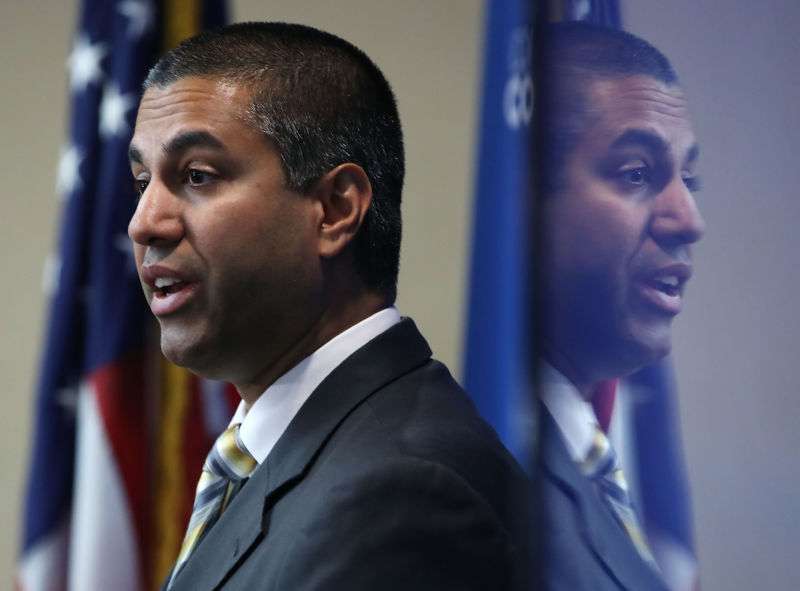
Ajit Pai’s new gift to cable companies would kill local fees and rules

Ajit Pai is continuing his multi-year battle against local broadband regulation with a plan that would stop cities and towns from using their authority over cable TV networks to regulate Internet access.
Chairman Pai’s proposal, scheduled for a vote at the Federal Communications Commission’s August 1 meeting, would also limit the fees that municipalities can charge cable companies. Cable industry lobbyists have urged the FCC to stop cities and towns from assessing fees on the revenue cable companies make from broadband.
If approved, Pai’s proposal would “Prohibit LFAs [local franchising authorities] from using their video franchising authority to regulate most non-cable services, including broadband Internet service, offered over cable systems by incumbent cable operators.” Pai’s proposal complains that “some states and localities are purporting to assert authority” to collect fees and impose requirements that aren’t explicitly allowed by Title VI, the cable-regulation section that Congress added to communications law with the Cable Act of 1984.
Pai’s proposal says:
These efforts appear to have followed the decision by the Supreme Court of Oregon in City of Eugene v. Comcast, which upheld a local franchising authority’s imposition of an additional 7% “telecommunications” license fee on the provision of broadband services over a franchised cable system with mixed-use facilities. To address this problem, we now expressly preempt any state or local requirement, whether or not imposed by a franchising authority, that would impose obligations on franchised cable operators beyond what Title VI allows.
Despite the Oregon Supreme Court ruling against Comcast, Pai’s plan says “the majority of courts… have interpreted section 622(b) to prohibit states and localities from charging fees that exceed those expressly permitted by Title VI.” Section 622 prevents local authorities from collecting more than 5 percent of a cable operator’s gross revenue in any 12-month period.
Pai’s proposal also declares that “in-kind” contributions required by local franchising authorities must count toward that 5 percent cap, “with limited exceptions, including an exemption for certain capital costs related to public, educational, and governmental access (PEG) channels.”
FCC lacks power to preempt, group says
But does the FCC have the power to preempt these local fees and requirements? Consumer-advocacy group Public Knowledge argues that the FCC can’t preempt local broadband regulations because the Pai-led FCC gave up its own authority over broadband. The FCC did that when it reclassified broadband as an information service as part of its repeal of net neutrality rules, Public Knowledge said.
“Having classified broadband as an information service, the Commission has determined that it is an unregulated service that it lacks regulatory authority over,” Public Knowledge wrote in a November 2018 filing that urged the FCC to drop the plan. The FCC cannot regulate or preempt local regulation of “any service that does not fall within its Title II jurisdiction over common carrier services or its Title I jurisdiction over matters ‘incidental’ to communication by wire,” the group said.
The FCC could “assert ancillary authority over broadband” using its power to regulate “services that fall within its general jurisdictional scope of ‘communications by wire or radio,'” Public Knowledge said. But the FCC has declined to assert such ancillary authority in this case, so it doesn’t have the power to preempt, the group argued.
Public Knowledge’s argument is the same one used by state attorneys general and other litigants against the FCC’s attempt to preempt state-level net neutrality rules. That matter is already being litigated at the US Court of Appeals for the District of Columbia Circuit, which could issue a ruling at any time. The outcome of that case could affect any future appeals of Pai’s new preemption plan.
In another preemption effort, Pai’s FCC last week voted to kill part of a San Francisco ordinance that promotes broadband competition in apartment buildings and other multi-tenant structures. Pai’s FCC also preempted about $2 billion worth of local fees charged to wireless carriers for placing equipment on public rights-of-way.
Decade-plus fight over fees
Cities and towns have been fighting FCC attempts to limit their authority over cable networks for more than a decade. Pai’s plan stems from a July 2017 ruling by the US Court of Appeals for the 6th Circuit in a case over FCC orders that go all the way back to 2007.
The 2017 court ruling vacated previous FCC attempts to treat “in-kind” payments as “franchise fees” toward the 5 percent cap, and it vacated an FCC attempt to “bar local franchising authorities from regulating the provision of non-telecommunications services by incumbent cable providers.” The court remanded the case to the FCC, saying the commission must explain which in-kind contributions are franchise fees and provide a valid legal basis to preempt local regulation.
Pai’s new proposal justifies preemption by pointing to Cable Act language that says “[a] franchising authority may not regulate the services, facilities, and equipment provided by a cable operator except to the extent consistent with [Title VI of the Act].”
Pai has gone forward with the plan despite municipal opposition. The FCC proposals “violate the plain language of the statute which authorizes Local Franchise Authorities (LFAs) to both collect franchise fees and to impose franchise requirements on cable operators,” said an FCC filing by dozens of local governments including Anne Arundel County, Maryland; Boston, Massachusetts; Atlanta, Georgia; Dallas, Texas; the District of Columbia; Portland, Oregon; and Los Angeles, California.
The cable industry’s main lobby group, NCTA, urged the FCC to approve Pai’s plan, saying the commission should “rein in the harmful practices of state and local franchising authorities who ignore the clear limits in the Cable Act, to the ultimate detriment of consumers.” The group said that the financial impact of local fees “could fall entirely on cable operators, entirely on consumers, or on both groups.”




